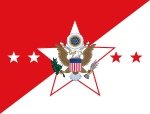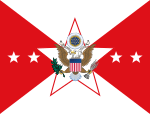George Decker
| George H. Decker | |
|---|---|
 General George H. Decker, official portrait by Woodi Ishmael | |
| Born |
February 16, 1902 Catskill, New York |
| Died |
February 6, 1980 (aged 77) Washington, D.C. |
| Allegiance |
|
| Service/branch |
|
| Years of service | 1924-1962 |
| Rank |
|
| Commands held |
Chief of Staff of the Army Eighth Army VII Corps 5th Infantry Division |
| Battles/wars | World War II |
| Awards |
Army Distinguished Service Medal (2) Silver Star Legion of Merit Bronze Star |
General George Henry Decker (February 16, 1902 – February 6, 1980) was Chief of Staff of the United States Army from 1960 to 1962. General Decker was born in Catskill, New York and attended Lafayette College in Easton, Pennsylvania, receiving an economics degree in 1924. He served in the U.S. Army from 1924 to 1962. He married the former Helen E. Inman in 1926. He died on February 6, 1980 in Washington, D.C.
Military career
According to his official U.S. Army biography, he was commissioned a second lieutenant of infantry in June 1924, and began his Army service with the 26th Infantry Regiment, then stationed at Plattsburg Barracks in upstate New York. In 1928, he was sent to Hawaii, where he served with the 35th Infantry Regiment until 1931. He was promoted to first lieutenant in April 1930. After attending advanced infantry training at the Infantry School at Fort Benning in 1932, he remained at Fort Benning with the 29th Infantry Regiment until 1935, followed by service at Vancouver Barracks, near Portland, Oregon with the 7th Infantry Regiment from 1935 to 1936 (during which time he was promoted to captain, in August 1935).
In 1936, he was sent to the Command and General Staff School at Fort Leavenworth, from which he graduated in 1937. Subsequently, he served with the 10th Infantry Regiment at Fort Thomas, Kentucky and Fort McClellan, Alabama, and the 9th Infantry Regiment at Fort Bragg, North Carolina. In 1940 he took command of Headquarters Company, I Corps, at Fort Jackson, South Carolina and was assistant supply and logistics officer, 1940–1941. In 1941 came a flurry of promotions: to temporary major (January), permanent major (June), and temporary lieutenant colonel (December). He was sent to Washington, D.C. to serve on the War Department General Staff, where he was assigned to the Office of the Assistant Chief of Staff for Supply. He was promoted to temporary colonel in October 1942 and became deputy chief of staff of the Third Army, Fort Sam Houston, Texas. He was then sent overseas to the Southwest Pacific, where he became deputy chief of staff and then chief of staff of the Sixth Army, a position he held through the end of World War II. He had been promoted to temporary brigadier general in August 1944 and major general in June 1945, and participated in Sixth Army operations in New Guinea, the Solomon Islands and the Philippines.
General Decker returned to Washington in 1946 to Headquarters, Army Ground Forces and Headquarters, Army Service Forces, but soon went back to the Pacific as deputy commanding general and chief of staff of United States Forces, Middle Pacific, Hawaii from 1946 to 1948.
General Decker became commanding general of the 5th Infantry Division in 1948, and in 1950 was assigned to the Office of the Comptroller of the Army as Chief of the Budget Division. Promoted to temporary lieutenant general in 1952, he became comptroller of the Army from 1952 to 1955. He was promoted to permanent brigadier general in April 1953 and permanent major general in July 1954. In 1955, he went to Germany as commanding general of VII Corps at Stuttgart, and was promoted to temporary general in May 1956.
From 1956 to 1957, General Decker was deputy commander-in-chief of the United States European Command at its headquarters in Rocquencourt, outside Paris, France. From 1957 to 1959 he was commander-in-chief, United Nations Command, and commanding general, United States Forces, Korea and Eighth U.S. Army.
General Decker was appointed Vice Chief of Staff of the Army in 1959, and on October 1, 1960 became Chief of Staff of the Army, serving in that capacity until September 30, 1962. According to his Army biography, highlights of his tenure were supervising augmentations to meet the crisis in Berlin (surrounding the construction of the Berlin Wall in 1961), increasing special warfare forces, initiating new divisional and forward depot concepts, and expanding the Army to sixteen divisions. General Decker retired at the end of his tenure.
Awards and decorations
 Army Distinguished Service Medal with one oak leaf cluster
Army Distinguished Service Medal with one oak leaf cluster Silver Star
Silver Star Legion of Merit
Legion of Merit Bronze Star Medal
Bronze Star Medal- American Defense Service Medal
- American Campaign Medal
- Asiatic-Pacific Campaign Medal with four campaign stars
- Army of Occupation Medal
- National Defense Service Medal
- Philippine Presidential Unit Citation
- Philippine Liberation Medal with three stars
- Philippine Independence Medal
See also
| Wikimedia Commons has media related to George Decker. |
References
- ↑ 6000th Opron "The Starlifters" Tachikawa, A.B., Japan. HQ 5th A F. Fuchu, Japan.
- Bell, William Gardner (2005) [1983]. "George Henry Decker". Commanding Generals and Chiefs of Staff 1775-2005. United States Army Center of Military History. CMH Pub 70-14.
| Military offices | ||
|---|---|---|
| Preceded by Gen. Lyman Lemnitzer |
Vice Chief of Staff of the United States Army 1959 – 1960 |
Succeeded by Gen. Clyde D. Eddleman |
| Preceded by Lyman L. Lemnitzer |
Chief of Staff of the United States Army 1960–1962 |
Succeeded by Earle G. Wheeler |

